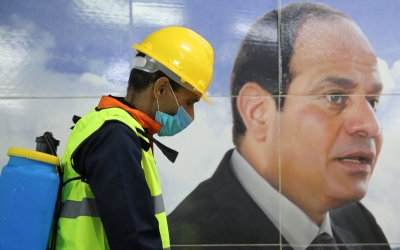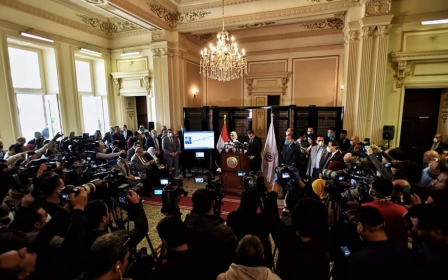Coronavirus: Egypt's banks instructed to limit withdrawals and deposits

Banks in Egypt have been told to impose temporary limits on daily withdrawals and deposits in an apparent effort to control inflation and stockpiling as concern grows over the spread of the coronavirus in the country of 100 million.
The daily limit for individuals would be 10,000 Egyptian pounds ($635) and 50,000 Egyptian pounds for companies, a central bank statement said.
Businesses, however, will be allowed to pass the withdrawal limit if the money is used to pay employees.
The central bank has also limited daily ATM withdrawals and deposits to 5,000 Egyptian pounds, the statement said.
"Not official, but I heard (it was designed) to control hoarding and inflation," one analyst told Reuters on condition of anonymity.
"This could reduce hoarding and panic buying and contain prices," the news agency quoted a second analyst as saying.
The central bank has also called on people to restrict their use of cash and to rely on electronic transfers and e-payments, seemingly to avoid the spread of the virus on banknotes.
"All banks cancelled fees on transfers and e-payment methods for the citizens' convenience," the statement said.
Egypt reported 40 new coronavirus cases and six fatalities on Saturday, bringing the total to 576 confirmed infections and 36 deaths.
Still, Toronto-based researchers who study infectious diseases have estimated that Egypt's real number of infections in mid-March at more than 19,000.
Earlier this week, Egypt expelled a correspondent for the Guardian over citing the Canadian researchers' data.
The Egyptian military has imposed strict measures in some locations to limit the spread of coronavirus, including banning vacations and isolating soldiers returning from missions, according to a document obtained by Middle East Eye.
Egypt also ordered mosques to shut their doors to worshippers for an indefinite period of time.
Middle East Eye propose une couverture et une analyse indépendantes et incomparables du Moyen-Orient, de l’Afrique du Nord et d’autres régions du monde. Pour en savoir plus sur la reprise de ce contenu et les frais qui s’appliquent, veuillez remplir ce formulaire [en anglais]. Pour en savoir plus sur MEE, cliquez ici [en anglais].





